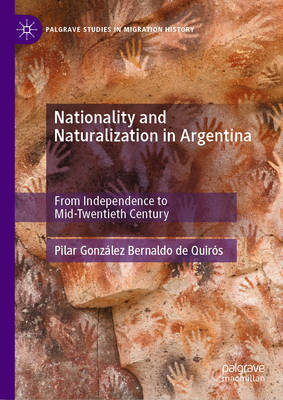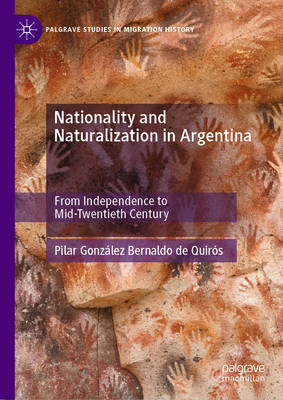
Bedankt voor het vertrouwen het afgelopen jaar! Om jou te bedanken bieden we GRATIS verzending (in België) aan op alles gedurende de hele maand januari.
- Afhalen na 1 uur in een winkel met voorraad
- In januari gratis thuislevering in België
- Ruim aanbod met 7 miljoen producten
Bedankt voor het vertrouwen het afgelopen jaar! Om jou te bedanken bieden we GRATIS verzending (in België) aan op alles gedurende de hele maand januari.
- Afhalen na 1 uur in een winkel met voorraad
- In januari gratis thuislevering in België
- Ruim aanbod met 7 miljoen producten
Zoeken
Nationality and Naturalization in Argentina
From Independence to Mid-Twentieth Century
Pilar González Bernaldo de Quirós
€ 244,45
+ 488 punten
Omschrijving
This book examines nationality as a historical process, addressing state policies to welcome or restrict naturalizations, and individual strategies to obtain this legal status. The focus is on Argentina, the primary recipient of Atlantic migrations in independent Latin America until the mid-twentieth century, taking a global perspective. Based on an extensive corpus of documents, including unpublished archives, the study offers new insights into over a century of naturalization history in Argentina. The gendered approach to legal practices allows for innovative interrogation of archives, such as Argentine Supreme Court rulings. The exploration of well-established archives, like those in foreign relations, sheds light on previously unanalyzed phenomena, such as the existence of Argentine natives held in concentration camps in Spain during the Civil War.Structured into eight chapters, the book uses a historical-analytical framework to examine the evolution of nationality in Argentina from 1811 to the present. It traces the origins of citizenship from "natives of the Kingdom" to the development of a national doctrine, and covers global regulations of nationality policies and naturalizations during mass migrations from 1880 to 1930. The work also delves into gender perspectives and the political categorization of "undesirable Argentines." The research intersects various academic fields within the framework of the global shift in social sciences, exploring the impact of globalization on sovereignty, nationality, and citizenship. The findings contribute to migration history, international law history, citizenship studies, international relations history, and the formation of nation-states in post-colonial Latin America.
Specificaties
Betrokkenen
- Auteur(s):
- Uitgeverij:
Inhoud
- Aantal bladzijden:
- 374
- Taal:
- Engels
- Reeks:
Eigenschappen
- Productcode (EAN):
- 9783032134035
- Verschijningsdatum:
- 26/02/2026
- Uitvoering:
- Hardcover
- Formaat:
- Genaaid
- Afmetingen:
- 148 mm x 210 mm

Alleen bij Standaard Boekhandel
+ 488 punten op je klantenkaart van Standaard Boekhandel
Beoordelingen
We publiceren alleen reviews die voldoen aan de voorwaarden voor reviews. Bekijk onze voorwaarden voor reviews.









